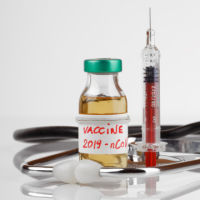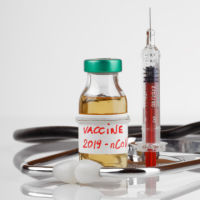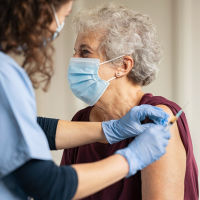24 April marks the start of World Immunization Week. This initiative of the World Health Organization (WHO), aimed at promoting the use of vaccines around the world, will last till 30 April. What impact is the COVID-19 pandemic having on immunisation services? How is vaccination viewed across Europe?
You may also like: Where Does COVID-19 Vaccine Development Stand?
According to WHO, immunisation services in the COVID-19 pandemic must continue. Otherwise there are risks of triggering a resurgence of diseases that can be prevented, such as measles and polio. Further on, these new disease outbreaks will overwhelm health systems already battling the impacts of COVID-19.
“While the world strives to develop a new vaccine
for COVID-19 at record speed, we must not risk losing the fight to protect
everyone, everywhere against vaccine-preventable diseases. These diseases
will come roaring back if we do not vaccinate,” said Dr Tedros Adhanom
Ghebreyesus, WHO Director-General, in a statement.
In 2018, 86% of children under the age of five across
the world were vaccinated with three doses of diphtheria, tetanus and pertussis
(DTP3) and one dose of the measles vaccine, up from 72% in 2000 and 20% in 1980.
The number of children paralysed by polio has been reduced by 99.9% worldwide. Yet,
global vaccination coverage is still far from the necessary 95%, and diseases
such as measles, polio, diphtheria and yellow fever are still of high concern. In
Europe, suboptimal vaccination coverage rates, mostly due to vaccine hesitancy,
have led to the resurgence of vaccine-preventable diseases in recent years.
The UN agency calls all the countries to maintain
immunisation services. This includes facilitating re-opening the services in
places where they have been disrupted, ensuring strong supply chains, disease
surveillance and trained health workers.
In March, WHO updated its guidance on immunisation
activities following the COVID-19 outbreak. It is noted, however, that rapid vaccination
campaigns may still be essential after a careful risk assessment analysis. COVID-19
and Immunization Guidance and related documents can be accessed here.
What Parents Think of Vaccination
In the meantime, parents’ opinions on vaccination vary widely across major European countries.
A recent survey
showed that 94% of parents in Spain are pro-vaccination. This is highest rate,
and in France there is the lowest, with 73% of parents are in favour of
vaccination. Other results include 88% for Germany; 87% for Italy and 86% for
the UK. Results from the UK and Germany show that 3% of parents are against all
vaccinations versus less than 1% in the other countries.
The survey results are part of a study due to be presented at the European
Congress of Clinical Microbiology and Infectious Diseases (ECCMID), by
Professor Jean Paul Stahl, University Hospital Grenoble, France, and
colleagues.
Vaccinoscopie Europe is a web-based survey conducted in 2019. The representative
sample included 1,500 parents of children aged 0 to 35 months in France,
Germany, Italy, Spain and the UK: 150 sets of parents (mother and father) of
children in each country.
In all countries, over 90% of parents were favourable to mandatory
vaccination for at least certain vaccines (for tetanus, whooping cough, measles
and rubella among others). In Germany and the UK the highest proportion of
parents are against compulsory vaccination: 7.8% and 7.4% respectively. In
France, it is 4%; in Italy, 1%; and in Spain, 0.8%.
When asked about the knowledge about vaccination, French parents felt
significantly less well informed (77% well informed) than parents from the
other countries (90-94% well informed). Also, in France the level of trust in
health authorities was the lowest: 68% vs. 88% in Spain (the highest
proportion).
The preferred source of information about vaccination in all countries is a
health care vaccinator followed by the internet (mostly, health authorities'
websites), friends and families.
Other Resources
World Immunization Week campaign website
Immunization coverage factsheet
Guiding principles for immunization activities during the COVID-19 pandemic
Image credit: Manit
Chaidee via iStock



























